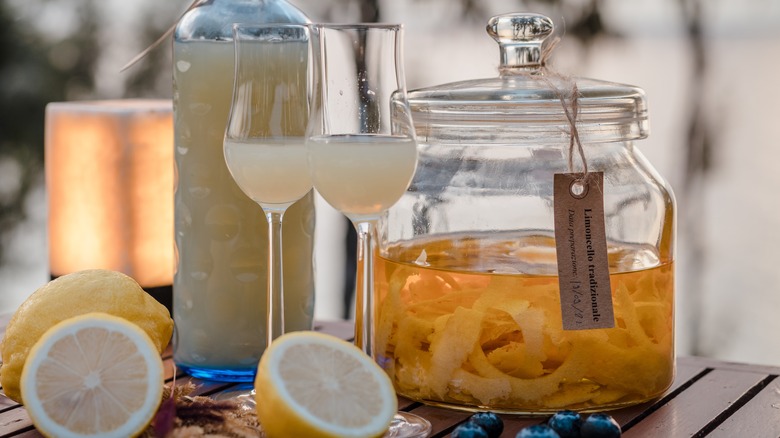The Ideal Steeping Time For A Light Limoncello
When summer rounds the corner, turning a damp and dreary spring into a few months of sunny skies and smoldering heat, those of us with a love of Italian drinks get an irresistible craving for limoncello. It is the perfect summer liqueur to chill and sip on as flowers bloom and bumble bees get back to work. Limoncello aka Lemoncello is a syrupy, sweet, and stunningly lemony drink that graces the tables of Italians every year as an apéritif. According to Delicious Table, it can be drunk, poured over ice cream, used as a citrusy glaze over fruit, or even used to make a lemon cream sauce for pasta.
The history of Limoncello is a bit mysterious. Italy Magazine says that there are multiple stories about who, where, and when Limoncello was first invented, however, it is believed that the affluent Italian Sorrento families were known to serve the drink on special occasions. Limoncello is one of those drinks that takes time to brew up at home but is well worth the weight because you can dictate how strong, sweet, and zesty your drink can be.
Don't oversteep!
Limoncello is created by putting clean lemon peels directly into ethanol or vodka. My Recipes tell us that in doing so, the oil trapped in the skins of the lemons will slowly release, infusing the alcohol with the fruit's flavor and vibrant color! After this successful steeping process is when simple syrup is added to the maker's liking to sweeten up the bottle. Most homemade Limoncellos end up with an ABV (Alcohol By Volume) of between 25-30%.
But you can't just steep your lemon and booze mixture overnight and expect it to taste flavorful. According to Masterclass, you must choose the amount of time you spend steeping based on how strong you want the lemon flavor to be prevalent. If you want subtle Limoncello steep for 1–2 weeks, but if you're looking for a more intense flavor you should expect to wait up to a month. Forbes warns Limoncello makers that there is such a thing as over-steeping and it can ruin the liqueur altogether so keep a close eye on your booze. If the lemon you put in the liquid turns brown, you'll have to immediately remove the fruit peel from the alcohol, or your whole drink will become discolored.

